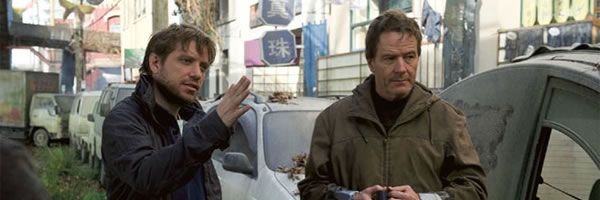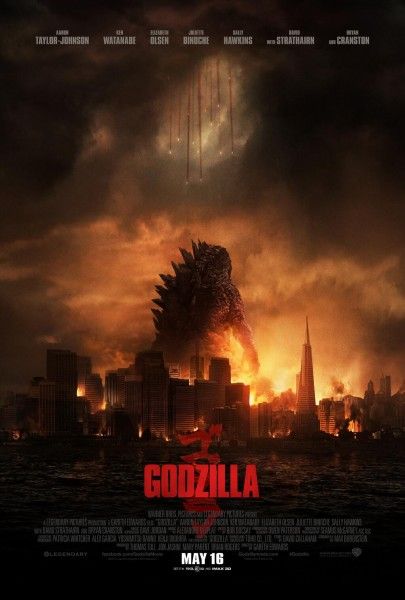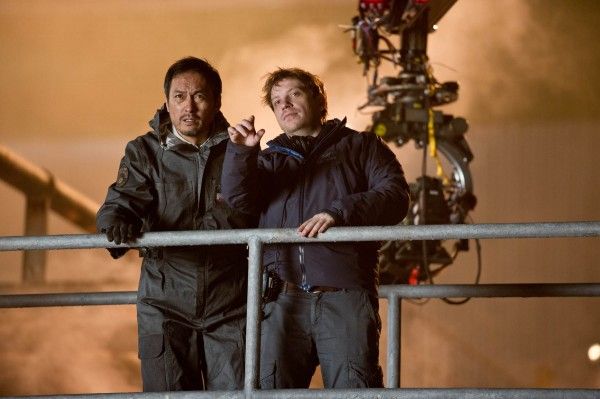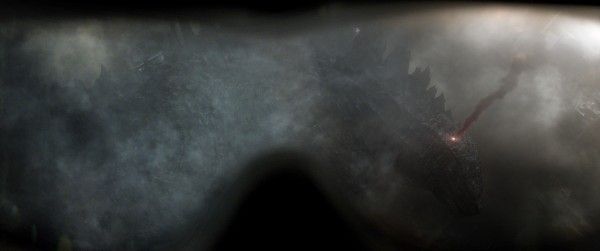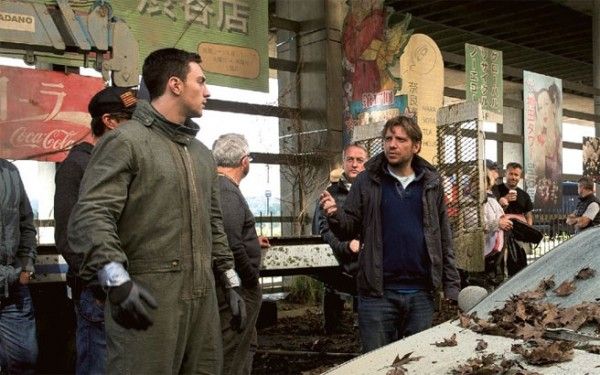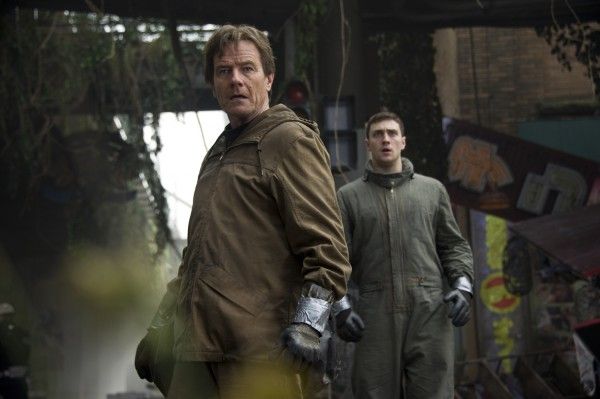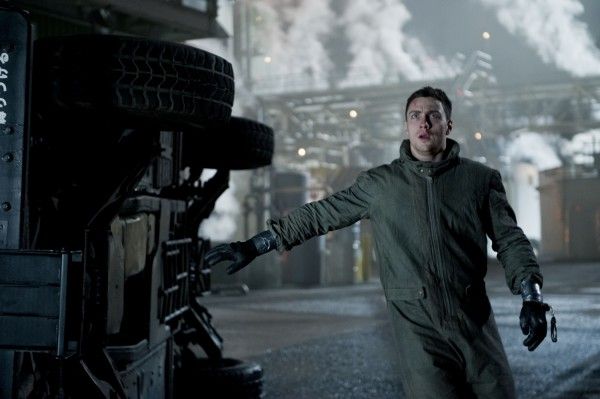Filmmaker Gareth Edwards has made a bit of a leap between his feature debut and his follow-up. His breakthrough feature, 2010's Monsters, was made on a budget of $500,000, but those who have seen it know that it looks like it cost ten times as much. His talent was in adding details to flesh out the world and provide a great sense of atmosphere. Now he's directing Godzilla, a tent-pole blockbuster featuring a beloved character, and while the stakes are high and the action is humongous , his focus on world-building and characters remains.
Last June, some fellow journalists and I visited the set, and during a break in filming, we got a chance to chat with Gareth Edwards. During our conversation, we talked about the themes of the picture, making the leap from an indie to a blockbuster, Easter eggs, if anyone is going to shout, "It's Godzilla!", and more. Hit the jump to check out the interview. Godzilla opens in 2D, 3D, and IMAX 3D on May 16th.
What distinguishes a "Gareth Edwards" Godzilla from Michael Bay or any other director? How will I know this is a Gareth Edwards film? Is there a signature you think you have?
GARETH EDWARDS: I don't know. We talked about it a little bit. I think something that's coming through that I'm quite pleased about and I'm really proud of is that there's a lot of scenes we've already shot that are quite engaging. Like you're really pulled in with the way the characters are coming together and the actors. I can't go into too much detail because it will ruin the movie for you, but we've watched dailies and teared up on a few occasions, so I'm really proud. Hopefully, this will be a blockbuster where you really care about the people you're following. Obviously, there's a giant, epic spectacle to it as well. I think, for me, if I'm honest, I'm personally not a fan of some of the Hollywood blockbusters that come out, and we're trying to hark back to the movies we all grew up and loved like early Spielberg stuff, and trying to get a bit more restraint and suspense, and not this cutting-every-three-seconds and explosions-every-two-seconds mentality. Like this fear people will get bored. We're trying to respect the audience, and hopefully they want to see a good story well told and not panic every minute that they might get bored. So hopefully we've been quite brave with the storytelling that we're doing. But we'll see. I say all this, and then we see the edit, and it reveals itself again to you. It's really hard at this stage to be that definite about everything in the movie because we're still finding it.
In the original film, the themes are so socially and historically relevant in terms of the atomic bomb. Is there any comparison in this film to social or historical themes?
EDWARDS: There's definitely a strong theme in the film, and in simplest terms it's kind of "Man v. Nature" And when we started off in the process of defining Godzilla, what is he about, what makes a Godzilla movie, what makes a monster movie, and we were brainstorming and watching all the old movies again, the thing that comes through is that in some movies, he's slightly evolved and represents different things, but he's always a force of nature like the wrath of God that comes to put us back in our place when we kind of thing we own the world. I would go into more detail, but I've been told I can only say certain things, but there's definitely a very strong themes that hark back to the original 1954 Godzilla. It's the "Man v. Nature" that comes through a lot. It's a recurring theme on the set today the way that nature always wins. You can't control nature. When we start thinking we can control nature, that's when it all starts to go wrong. And that happens a lot in our movie. You see it quite a bit, that is our arrogance always comes back to bite us.
What about the secondary threat? Does that turn the tables for what you want the audiences to feel towards Godzilla? Because obviously, Godzilla is a threat, but does he take on a heroic aspect at some point in the film like in the sequels that we've seen?
EDWARDS: I'm not sure what I can and cannot say, but I'll say that it was really important that we didn't do a Godzilla movie where it wasn't just one creature because you can quickly run out of people pointlessly trying to fire and stop thing thing storyline, which is why Toho movies were always him versus something else, and the whole "franchise" or whatever you want to call it was involved in the creatures. So when you get into it, you have to make that choice that you mentioned and we made…a choice…but without giving too much away, it's not as simple as that. It's not as simplistic as "Is there a good or a bad?" Through the course of the movie it starts to form, and…it's really hard to answer these questions.
Is anyone going to say the classic line, "It's Godzilla!"
EDWARDS (laughs): For a long time, we liked the idea of never ever saying his name. And we had a million ideas of how you could say that name. And it might be that one of them ends up in the movie. We're still playing with a couple of them. But I think it's just as good to never say his name out loud. We're going to have it on every single poster and every single everywhere. There's something more ethereal about a person you don't really label. It's so obvious to say, "It's Godzilla," and we have the same problem in a lot of scenes. How do you talk about this thing? Is it a thing? Is it a creature? Is it a monster? Is it an organism? Is it an animal? And we kind of use all of those, and wait for the right moment to use the actual name gag. I saw [Man of Steel] last night and thought they were quite clever about it.
There are these different time periods that we've seen, so it seems like there's an awareness of Godzilla existing in the past, or this creature existing in the past, and now it's going to exist again? Is it the idea that people are making the same mistakes again and again? Is it finding different ways for him to rise?
EDWARDS: It is an origin story. It's not about having seen another film to understand this movie. It's supposed to be the beginning. But it doesn't just take place in modern times. There are other aspects to it. And in a way, the mistakes we made in the past come back to haunt us in the present, and that is something that the whole movie is driven by—whether you want to call them "mistakes" or "choices"—that now we pay the price for. Because for me, a monster movie just for the sake of being a monster movie can kind of become a pointless exercise, so it's about finding the right symbolism in what he represents and trying to find a storyline that expresses that. And I'm really pleased with the playground we're playing in because I think it's very much on theme. And I hope that when people see it who are big Godzilla fans, they'll be happy with the choices we made. We definitely tried to stay as true as possible to the original in terms of thematics.
Does Godzilla have his own personality in the film? In Monsters at the end, you thought they were one thing and they turned out to be something else. Did you apply the same process to Godzilla?
EDWARDS: I guess with all good characters, there's some sort of arc to their character, and sometimes that's not theirs; it's our understanding of that character that changes. I don't think we could be the best film we could be if there wasn't a perception change in the movie. So it does evolve, but it's not straightforward, and it's not black and white. Hopefully, it's subtle enough that people can watch it and have their own opinion of him and what was really going on. But amongst ourselves, we've made decisions and hinted at certain choices, but I like the idea that if someone people just want to come and watch a big, massive monster movie, they can and have fun watching things get smashed up; and other people can come and there will be another layer and a bit more meaning to some of the things that happen. Because at the end of the day, we're not really going to have a giant monster attack the world. It's not something we need to worry about—
You say that now.
EDWARDS (laughs): --but the ramifications of the giant monster attacking the world—skyscrapers collapse, whole neighborhoods are trashed, radiation is left behind—they're things we deal with all the time, and that's probably why we invent monsters. It's usually sci-fi and fantasy films that get to address modern day concerns quickest because they can kind of go under the radar, and more serious films have to kind of wait more in line. So hopefully it's not lightweight, popcorn fodder. I hope there's a little bit more about it than just that.
As a personal journey for you as a filmmaker, from Monsters to Godzilla, what have you learned about yourself? Do you have more patience now with a crew of thousands or is the smaller stuff easier to manage?
EDWARDS: I wouldn't call it a "journey". It's more like teleportation. It was like this instant, "There you go. You're making a massive movie."
Has it been overwhelming?
EDWARDS: Yeah. Yes, it was in the early days. But it's so incremental; it's like climbing a mountain. One step is not that different than the step before. Pre-production took—we presented the film to the studio last year, and we started filming in March. That's quite a long time to get ready for the fact that we were going to be making this. And no matter how much people warn you and tell you what it's going to be like, it's still sort of a culture shock. I've worked in TV, and it's like a micro-version of this. Yeah, I guess if the previous film is like riding a bicycle, this is like flying a 747. You still go left and right, and you're going to a destination—
As long as you land, it's all good.
EDWARDS: Yeah.
Can you talk about Toho's involvement? Has it been a licensing thing? Has there been active involvement with the structure of the film and story?
EDWARDS: I went to Japan probably over a year ago, and went to visit them, and met with the heads of the studio and the president of Toho, and they were very generous. They released Monsters, my previous film, and they had the rights to that and when I arrived, they had the DVD and Godzilla merchandise, and they were incredibly welcoming. We went to dinner and they had a few questions about the story and what we planned to do, and then from that point on, we've been sharing all the scripts with them; sharing the concept art and the development of the film, and they were heavily involved in the design of Godzilla in terms of approvals and everything, so it's very much been a Toho-approved Godzilla movie, which we wanted it to be, because for us it was very important that—It would be kind of pointless if Toho didn't feel like it was a real Godzilla movie. So we were pretty keen to try and get that right.
Were you able to squeeze in any Easter eggs that harken back to Monsters at all?
EDWARDS: There's loads of Easter eggs in this film. Is there anything to do with Monsters? What I'll tell you—and it doesn't really answer your question—but on Monsters, I had a bracelet that the girl in the film, Whitney, I made a charity bracelet for her character, and the idea was it was a pretend charity for people who had been displaced by the monsters. And everyone on that film wore it, and I wore mine from the day we started filming to after the world premiere. I was adamant I was going to do the same on this, but we had a minimum run of these of 400, so we gave one to the whole crew, and you'll spot them around; people are wearing these. [Shows us his bracelet] This is a clue to the movie; something in the movie happens and this is a clue, and that's all I can do. But you've been around the war room, right?
Yeah.
EDWARDS: Okay, then. So you can figure everything out.
Well when you mentioned Easter eggs, what Easter eggs? Are you throwing Easter eggs in for the previous Godzilla films at all?
EDWARDS: Yeah, there's a few in there. There's one right over in that room [gestures to the set where they've been filming] if you have a look. You might see it in the shot we're setting up later.
We saw the dinosaur and toy soldiers on the ground…
EDWARDS: Yeah, there's all that stuff going on, but there's something actually more specific.
Someone picks up a Pacific Rim toy.
EDWARDS [laughs]: Yeah. You're here all day, right?
Yeah.
EDWARDS: Okay, you'll see it then.
Is there one memory of filming that stands out in your mind from this whole production? Perhaps when you look back at this movie ten years from now, and you're watching it on television, one memory that comes from filming here.
EDWARDS: I've purposely not processed any of it. I think if you really comprehended what we're doing here, it would paralyze you. You just have to look at all the cars on your way in, down the street. That's just the crew for this film. I purposely just bank it in box in my brain, and try not to think about it. It still hasn't hit me. Like the other night, obviously, there's marketing aspects and visual effects aspects that have all started to happen already, and I had to quickly look at some video that was an approval thing to me, and it was like, "Oh my God, that's cool. That's like something you'd see in the cinema! Wow!" And there was this excitement over "Oh my God, this could go right in the cinema the way this looks. That's fantastic!", and then realizing, "Oh my God. That is going to go in the cinema." And I still haven't really let it set in because otherwise the pressure would be too much. It's really hard to take risks, and in doing anything slightly creative, if you've got too much pressure on you, it's not healthy. You don't do your best stuff. So it's been really hard to get rid of all those thoughts and not think of how much this is going to be around the world for a week or so next year.
Frank Darabont came in for a short but perhaps sweet time. Is there one story element that he was there to help crack?
EDWARDS: He did a fantastic job. There's a particular scene we finished filming the other day—I can't talk about it—but it was very strong, and it was all his idea. One of the actors that was in it, as we were just chit-chatting off to the side, said "This is the reason I took this job." And everyone felt that way when we were filming it as well. He brought a very emotional, powerful series of ideas to the story.
The film has been described as a "road movie". Would you agree with that in terms of how the journey takes place? And what about that pertinently lends itself to a Godzilla story?
EDWARDS: It's a global journey. I wouldn't say it's a "road movie", but it takes place around the globe, and there probably is a general "here and here"-thing that's going on, but…I don't know what you do or don't know…Tell me two countries you think the film is set in.
Japan, Hawaii, Philippines…
EDWARDS: So it felt like what we were doing with the franchise was taking something that was very Japanese, that belongs to Japan, and bring it to America. And so from a very early stage, it was the journey of this movie was a journey from Japan to America. That felt like the heart of everything. It felt the most appropriate, so Hawaii's in the middle of it, obviously. So we sculpted the story around that basic, global path. And it's not as literal as "something from Japan comes to America". It's not that straightforward. But it felt like visually we wanted that transition to happen from a feeling of a very Japanese thing to become an American thing.
This is certainly a character-driven piece to a large extent, but it's also a summer tentpole feature with Godzilla. We saw the concept art with the Battle of San Francisco. Just how big is that going to be?
EDWARDS: Well, obviously, the one downside to shooting this film is that we don't have Godzilla on set. He's too expensive, and in the trailer, and he has to do all of his stuff against green screen…well, blue screen, because green wouldn't key very well. I, honestly, there are certain key words that you bring up over and over, like "It's gotta be this," and "It's gotta be that." And, obviously, "emotional" gets in there, like you gotta care, but the other one by far is "epic". I feel like if we haven't made an epic movie by the end of this, if you haven't felt like you've gone on a massive journey, and you've nearly tear up and the hairs on the back of your neck have been raised and at the end of you're just, "Man, I want to see that again," then I probably failed at what we're trying to do. Because that's definitely the goal. Hopefully it's not spectacle for the sake of it, and not "Let's just throw every trick at the screen and try to distract the audience." It's more of a cinematic style like holding back and let the audience do the maths. Like a lot of our sequences, our set pieces, people don't talk much through them. It's all thoughts and visual storytelling. We'll see how it pans out, but the films I love are those sorts of movies, and everyone knows that's what we're trying to do.
Click on the corresponding links for more of my Godzilla set visit coverage:
- Matt Visits the Set of GODZILLA and Witnesses the Monster's Trail of Destruction
- Aaron Taylor-Johnson Talks the Tone of the Picture, the Raw Energy During Filming, and More on the Set of GODZILLA
- Bryan Cranston Talks about His Thoughts on the Script, the Appeal of a Character-Driven Blockbuster, and More on the Set of GODZILLA
- Legendary Pictures CEO and Producer Thomas Tull Talks GODZILLA, His Love for the Character, Handling Comic-Con, Pacific Rim 2 and More

